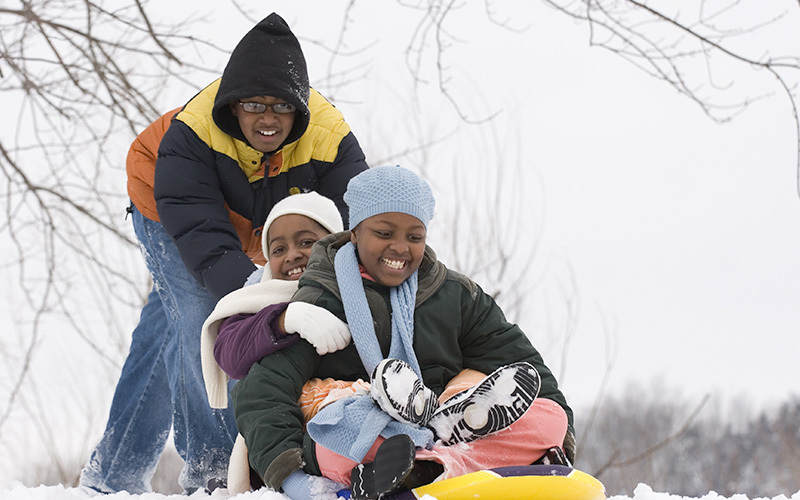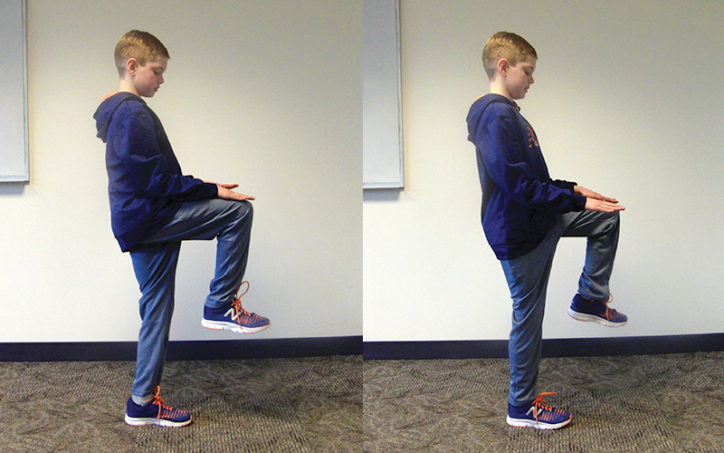Outdoors and indoors — How to keep your child active in winter

Don’t let frigid temperatures, snow and ice, and fewer hours of sunlight prevent your child from being active.
Instead of giving into the winter blues, embrace the season and ensure that fun physical fitness activities are part of your child’s daily routine. There’s good reason to stay active: “Exercise increases aerobic fitness, strengthens muscles and bones, helps build immunity, makes weight control easier, and can improve sleep,” says Cara Ebbeling, co-director of the New Balance Foundation Obesity Prevention Center at Boston Children’s Hospital.
Indeed, the U.S. Department of Health and Human Services recommends children get at least 60 minutes of daily physical activity. As part of its “fit kit Circuit” of exercises, the center encourages kids to exercise vigorously for 20 to 30 minutes within those 60 minutes, at least three times a week. Both recommendations apply not only to warm and sunny days but cold and cloudy ones as well, Ebbeling says. (Read the step-by-step guide to the fit kit Circuit.)
Winter’s weather makes the season unique for outdoor activities that are affordable or cost no money at all. Your child will probably jump at the chance to sled down the big hill in town, cross-country ski in a nature preserve, or ice skate under the lights of an outdoor municipal rink. Even an hour of shooting hoops at the local park will do. Basically, let your child pursue any activity that helps them hit the exercise goals outlined above. You’ll find you can keep your child active in winter almost on enthusiasm alone.

Dress appropriately for the outdoors and stay hydrated
To make outdoor activity enjoyable, it’s important that your child dresses appropriately. Ebbeling recommends a hat, gloves, and warm socks, and dressing in layers (a shirt and fleece or sweatshirt underneath a jacket works).
Also, make sure your child drinks water when exercising outdoors, says Maria Swartz, community outreach program manager of the New Balance Foundation Obesity Prevention Center.
Even though they might not sweat as much as they do in summer, they need to stay hydrated. And as much as your child may enjoy outdoor activities in winter, there will be days when extreme cold can cause frostbite. Pay attention to the weather report and find something fun to do together indoors on the coldest days.

Indoor exercise can be done in tight spaces
Your child might already spend the winter pursuing sports they love: hockey, skiing, basketball, kickboxing, or gymnastics. They’re probably exceeding the advised times for daily and vigorous exercise.
But if your child doesn’t belong to a formal program or isn’t motivated to regularly move around on their own, they shouldn’t view winter weather as a reason to abandon exercise. Fortunately, you don’t need a gym membership or expensive fitness equipment at home to get them moving indoors, Swartz says.
The center devised its fit kit Circuit to not only increase aerobic fitness but also build muscle and bone strength. No special equipment is required for any of the fit kit Circuit’s 14 exercises, which makes it ideal for living rooms and other tight indoor spots.
The secret to getting your child motivated for circuit training is to let them select exercises they enjoy, Swartz says. From the plank-driven “frogger” and side-to-side “ice skaters” to traditional push-ups and squats, there’s no shortage of options, she says. The exercises can be alternated in between bursts of activity, with periods of rest for your child.
It’s also worth checking out local community organizations such as Boys & Girls Club, YWCA, and YMCA for affordable indoor pursuits, Swartz says.
Learn more about the New Balance Foundation Obesity Prevention Center at Boston Children’s Hospital.
Related Posts :
-

Five running exercises you can do at home
Unlike a lot of athletes, runners haven't had to take time off during COVID-19. In fact, a lot of athletes ...
-

Regular physical activity linked to more 'fit' preteen brains
We know exercise has many health benefits. A new study from Boston Children’s Hospital adds another benefit: Physical activity ...
-

Gearing up for sports? Call your child’s pediatrician
Every year, young athletes are required to get sports physicals, clearing them for participation in organized athletics. But, did you ...
-

Improving treatment process so kids can return to sports after COVID-19
Children can’t wait for the next game, the next tournament. Sports means many things to them, including an escape ...





